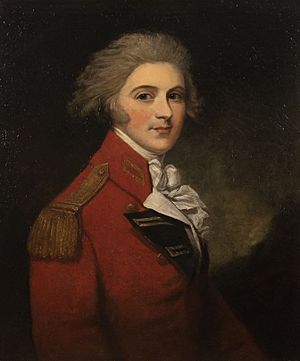Sir George Montgomery, 2nd Baronet facts for kids
Sir George Montgomery (born 1765, died 10 July 1831) was an important person in British history. He was an officer in the British Army and later became a politician. He belonged to the Tory political party. Sir George came from families in both Scotland and Ireland.
Contents
About Sir George Montgomery
Early Life and Army Career
Sir George Montgomery was the son of Sir William Montgomery, 1st Baronet. His mother was Anne Evatt, his father's second wife.
In 1778, when he was about 13 years old, George joined the army. He received a "commission," which meant he became an officer in the 68th Regiment of Foot. This was a common path for young men from noble families.
He worked hard and was promoted to captain in 1783. A few years later, in 1786, he moved to a different army group called the 14th Dragoons.
Becoming a Baronet
In 1788, something very important happened. Sir George's father passed away. His older half-brother, William, had died before their father. This meant that George inherited his father's special title. He became the "2nd Baronet." A baronet is a British title of honor, like a knight, but it can be passed down in the family.
Sir George left the army in 1790.
Working for the Government
Soon after leaving the army, Sir George got a new job. He became a "clerk of the head permit office" in the Dublin Castle administration. This was a government job in Ireland. It was a good position, paying £800 a year, which was a lot of money back then. He received this job from William Pitt the Younger, who was a very powerful politician at the time.
Sir George continued to get paid for this job until 1812. Then, a politician named Lord Liverpool decided to stop his payments. Sir George was not happy about this. He spoke to the new Chief Secretary for Ireland, Robert Peel. Mr. Peel helped Sir George by offering him a "pension," which is like a regular payment given after someone leaves a job.
Entering Politics
In January 1831, Sir George decided to become a "Member of Parliament" (MP). This means he wanted to represent an area in the British government. He stood for election in a Scottish area called Peeblesshire. The election was held because his cousin, Sir James Montgomery, 2nd Baronet, had retired.
Sir George won the election without anyone running against him. He promised to help keep the king and the country safe. He was elected again for the same area in the 1831 United Kingdom general election, again without anyone opposing him.
However, Sir George died on 10 July 1831, shortly after the government started meeting again. Records do not show him speaking in any of the debates in Parliament.
His Legacy
Sir George Montgomery never married. Because of this, when he died, his special title of Baronet ended. It could not be passed on to anyone else.
He owned property in both Scotland and Ireland. In his will, he divided his property among his family. His family home, called Magbie Hill, went to his nephew, John Isaac Beresford.
 | Selma Burke |
 | Pauline Powell Burns |
 | Frederick J. Brown |
 | Robert Blackburn |


